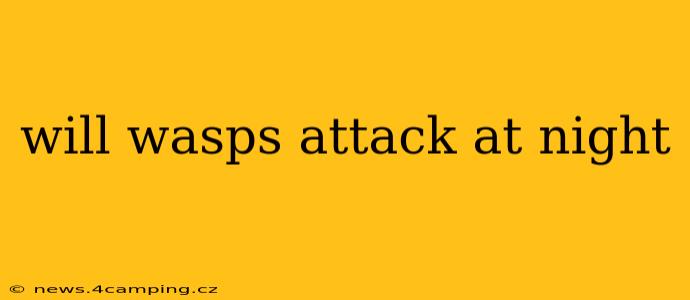Will Wasps Attack at Night? Understanding Nocturnal Wasp Behavior
Many people assume that wasps, like bees, are primarily active during the day. While it's true that most wasp species are diurnal (active during the day), the question of whether they'll attack at night is more nuanced than a simple yes or no. The answer depends on several factors, including the species of wasp, the weather conditions, and the level of provocation.
While daytime is their peak activity period, some wasp species are capable of stinging at night, albeit less frequently. This doesn't mean they're actively hunting at night, but rather, they might defend themselves if disturbed.
Why are wasp attacks less common at night?
Several reasons explain why nocturnal wasp attacks are less common:
-
Reduced Activity: Most wasps are less active at night. Their foraging and social behaviors significantly decrease with the setting sun. Their metabolism slows down, and they become less responsive to stimuli.
-
Diminished Vision: Wasps rely heavily on their vision to navigate and locate prey or threats. In the dark, their visual acuity is significantly reduced, making them less likely to detect and react to potential dangers.
-
Nest Defense: While less likely, wasps will still defend their nests at night if they feel threatened. This is particularly true if the nest is disturbed directly, such as by accidental contact or vibrations.
-
Species Variation: Different wasp species exhibit varying levels of nocturnal activity. Some solitary wasps might be more active at dusk or dawn, while others remain strictly diurnal.
What Attracts Wasps at Night?
Even though wasps are less active, certain factors can still draw them to your vicinity at night:
-
Light Sources: Artificial lights can attract flying insects, including some wasps, which are then more likely to encounter humans.
-
Sweet Smells: The smell of ripe fruit, sugary drinks, or other sweet substances can attract wasps, even at night.
-
Nest Disturbance: As mentioned, disturbing a wasp nest, even unintentionally, can trigger a defensive response regardless of the time of day.
Will a wasp sting me if I leave a light on?
Leaving a light on might increase the chances of attracting wasps to your vicinity but doesn't guarantee an attack. The most crucial factor is avoiding direct contact or threatening behavior. Wasps are generally not aggressive unless they feel threatened or their nest is disturbed.
Are there any wasps that are active at night?
While most wasps are diurnal, some species exhibit crepuscular behavior (active during twilight) or even limited nocturnal activity, particularly certain parasitic wasps. However, the vast majority remain primarily active during the daylight hours.
How can I avoid wasp stings at night?
- Keep lights off or use yellow lights: Yellow lights attract fewer insects than white or bright lights.
- Secure food and drinks: Store food and drinks properly to prevent attracting wasps.
- Avoid wasp nests: If you know of a wasp nest nearby, avoid the area, especially at night.
- Be cautious when moving around in the dark: Carefully check your surroundings before sitting or resting outdoors at night.
In conclusion, while a wasp sting at night is possible, it's significantly less probable than during the day. The best way to avoid wasp stings, regardless of the time of day, is to respect their space, avoid disturbing their nests, and be mindful of your surroundings.
